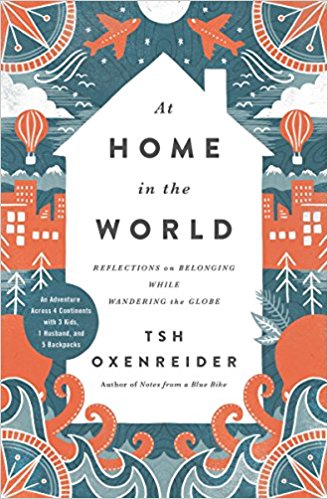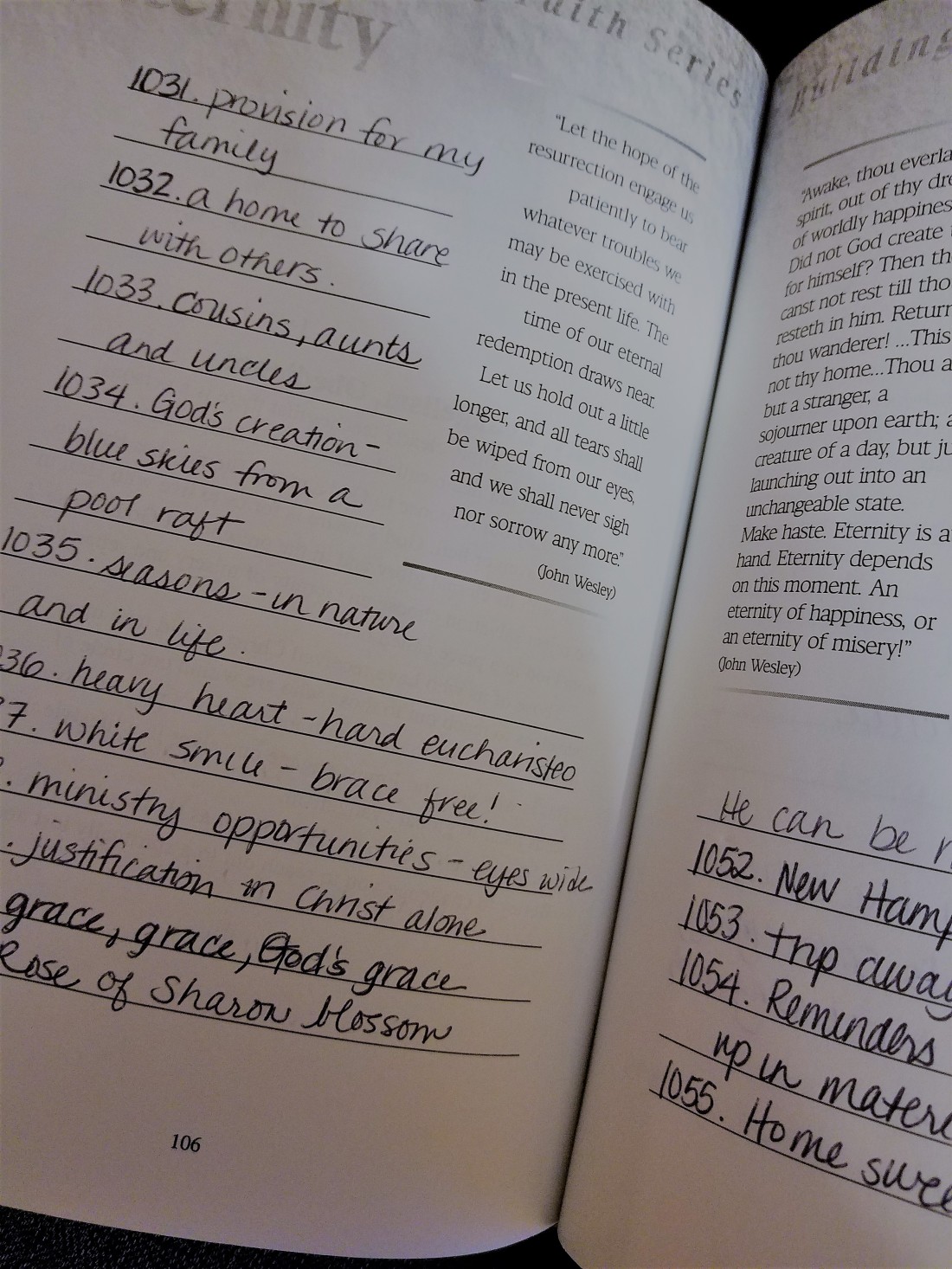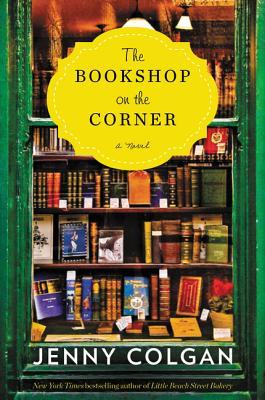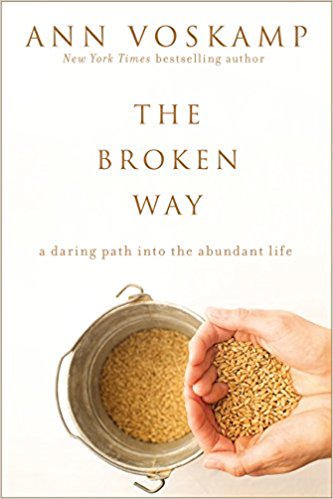
I read Voskamp’s second book once over a year ago and while it resonated with me some, it didn’t flow as easily for me as her first book had. I knew there was more than met the eye the first time around so this winter I picked it back up and read it again. I definitely got more out of it in the second reading but it was still a struggle. It felt choppy; disconnected; disjointed. It feels disorganized to me. I feel like chapters towards the end, belong at the beginning and vice versa. But, despite the difficulty I found in its flow, I still believe there is value so I have set out to dissect it a bit and hope, that in the end, this helps me sort out what God has for me in it…and maybe for you too.
What to Do with Your One Broken Heart? Each of us has it- some maybe to greater degrees than others- but each of us has had our heart broken in one way or another. That big dream that had the door slammed on it; that love you craved but never received; that unspeakable thing that was done to you before you were old enough to stop it; that friend who quit responding to your calls and emails- no explanation; that child you’ve lost; that job you worked so hard for-suddenly gone; that doctor’s visit where you got the bad news; the betrayal by your spouse; that shame after an impulsive decision that changed things forever; that sadness of disappointing one that you wanted so badly to impress; that addiction you just can’t shake. Yep, you wouldn’t be human (or truthful) if you haven’t felt heartache and hurt. If there’s one thing I can guarantee you’ll experience before your life is over it’s this- suffering and pain. No one is exempt. So, then, the question becomes, How in the holy name of God do you live with your one broken heart? (p. 15)
This is the question posed by author, Ann Voskamp, in her second book, The Broken Way: A Daring Path Into the Abundant Life. And not one thing is more important than figuring out how to live in the face of unspoken pain. (p. 12) While I did struggle some with this book, it is one of the best writings I’ve ever read on how to truly take the heartache, the pain, and the brokenness and allow God to use it to teach you and train you and eventually turn it into the path to the abundant life. In the gospels, when people were trying to figure out why a man was blind they attempted to blame his parents- or his own sin. But Jesus simply says, “This happened so that the power of God could be seen in him.” I don’t know about you but that is all I really want anyway… for my life to bring Him glory and for others to experience His glory as well. Always for our good and always for His glory. (p. 26) So I’m all in- Jesus, show me how You can take all the messiness of my life and those things that Satan intended to do me in, and use them for good. As Mother Teresa said, “There is such terrible darkness within me, as if everything was dead…I do not know how deeper will this trial go- how much pain and suffering it will bring to me. This does not worry me anymore. I leave this to Him as I leave everything else…Let Him do with me whatever He wants as He wants for as long as He wants if my darkness is light to some soul.” (p. 20)
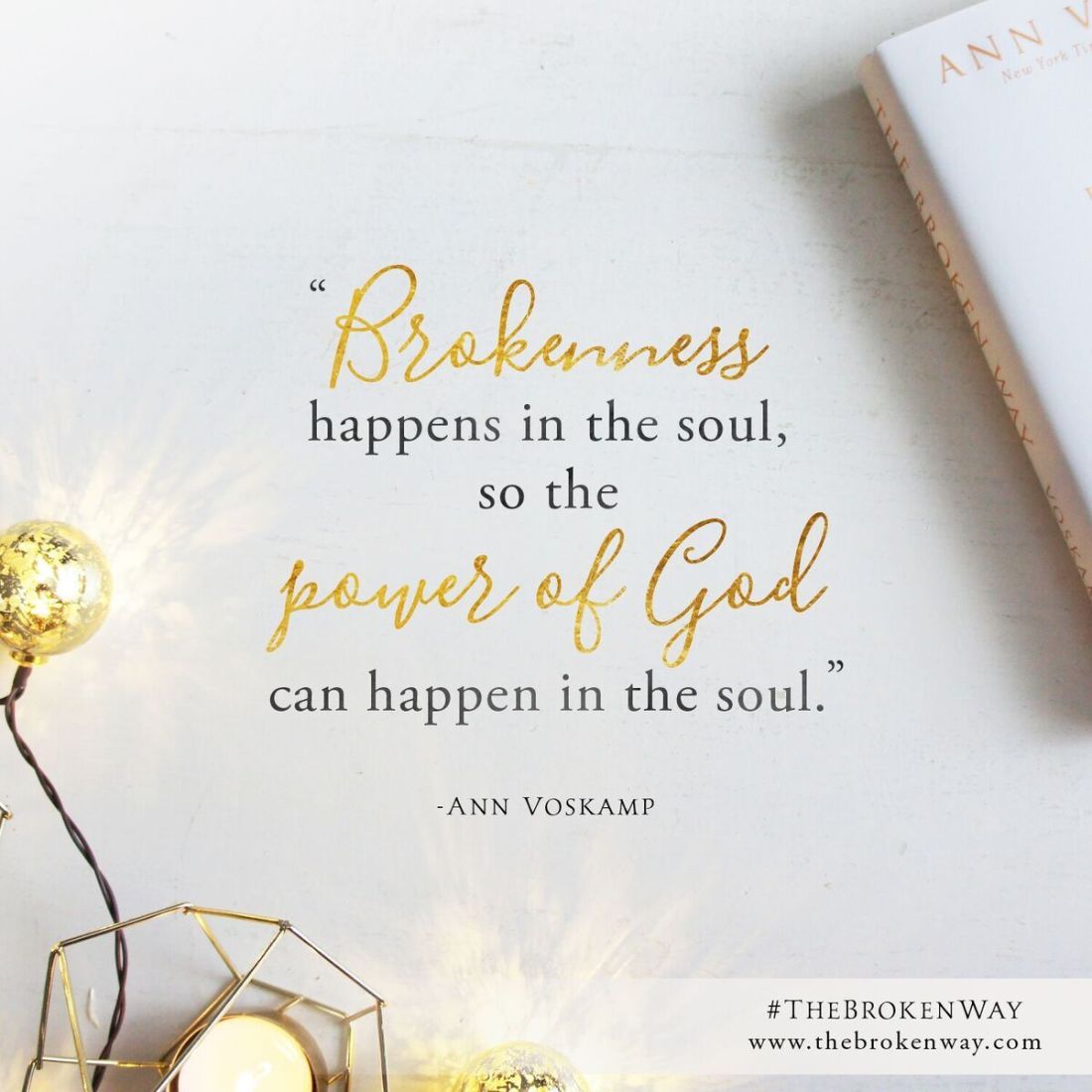
Maybe you can live a full and beautiful life in spite of the great and terrible moments that will happen right inside of you. Actually- maybe you get to become more abundant because of those moments. Maybe- I don’t know how, but somehow?—maybe our hearts are made to be broken. Broken open. Broken free. Maybe the deepest wounds birth deepest wisdom. (p. 24) But how? Isn’t this how it is with many things? The concept is not foreign. The seed breaks to give us wheat; the soil breaks to give us the crop, the sky breaks to give us the rain, the wheat breaks to give us the bread. And the bread breaks to give us the feast. (p. 25) I submit to you- it’s not the act of being broken that will lead us to the abundant life; but instead, it’s what we do after the breaking that determines our course. You’ve seen it- one person can be receive a terminal illness diagnosis and become bitter and unhappy, pushing everyone away. Yet another person can receive the same diagnosis and live out their days in joy, encouraging everyone whom they encounter. Two broken hearts. Two different responses.
If we’ve walked with Christ for any length of time we know that it’s in the shattered places, with broken people, we are most near the broken heart of Christ. (p. 32) And this, because He was broken for us. He understands our sufferings because He, Himself, suffered for us. We are called to remember this sacrifice regularly, ‘This do in remembrance of me.’ Even that act of remembering, we break the bread to remind us of His breaking on our behalf. And as we thank Him for His sacrifice, and we press into His wounds, we feel healing begin to creep into our own hurt places. The miracle of intimate union, of communion, comes through brokenness- through broken places and broken people and the brokenness of Christ and being broken and given. (p. 40) ‘I say unto you, unless a grain of wheat falls into the earth and dies, it remains alone; but if it dies, it bears much fruit.” And this is true for us as well- if we die to ourselves and live ‘given to Him and to others’ because of our union with Christ, then we too will experience abundance and find healing for our souls.
But this given life…what does it look like? It’s taking every moment that God has given you and learning how to make it meaningful. How do I have time to live this way? But then again, how do I have time to NOT live this way? We are each only given a certain number of days and none of us knows that number so we have to live as if today is the last. Learning the art of living is learning the art of giving. (p. 67) John 3:16, “For God so loved the world that He gave…” and we are called to do the same.
Isaiah 58:6-11 New International Version (NIV)
6 “Is not this the kind of fasting I have chosen:
to loose the chains of injustice
and untie the cords of the yoke,
to set the oppressed free
and break every yoke?
7 Is it not to share your food with the hungry
and to provide the poor wanderer with shelter—
when you see the naked, to clothe them,
and not to turn away from your own flesh and blood?
8 Then your light will break forth like the dawn,
and your healing will quickly appear;
then your righteousness[a] will go before you,
and the glory of the Lord will be your rear guard.
9 Then you will call, and the Lord will answer;
you will cry for help, and he will say: Here am I.
“If you do away with the yoke of oppression,
with the pointing finger and malicious talk,
10 and if you spend yourselves in behalf of the hungry
and satisfy the needs of the oppressed,
then your light will rise in the darkness,
and your night will become like the noonday.
11 The Lord will guide you always;
he will satisfy your needs in a sun-scorched land
and will strengthen your frame.
You will be like a well-watered garden,
like a spring whose waters never fail.
Christ gives us the gifts and then-He within us, indwelling us-He gives the gifts through us to a beautiful and aching world. (p. 69) Be the GIFT (Give It Forward Today). Give Him to this hurting world. Leave quarters in gumball machines; put encouraging notes up and down lockers in the school hall; bake cookies for the neighbor you’ve never reached out to; pay for the meals of the family at the next table; take flowers to the hospice home in your town; Leave chocolates for your local police; Take gift bags supplied with essentials to your local homeless shelter. Be the GIFT. It’s strange how that is: everybody wants to change the world, but nobody wants to do the small thing that makes just one person feel loved.(p. 74) What if instead of waiting for good enough things to happen to us, we could be the good thing to happen to someone else who’s waiting? (p. 87. Instead of trying to continually get more for ourselves, we learn to empty ourselves out? Broken and poured out. “Have this same attitude in yourselves which was in Christ Jesus…who…emptied Himself…He humbled Himself by becoming obedient to the point of death, even death on a cross.” You can’t have abundance unless you pour yourself out. Give yourself away. Be the GIFT. This is the love we all seek and love is simple and small and complicated and a kind of boring and the largest of all and love is all there is. It comes quiet. Real love is in the really small gestures- the way your hands, your feet, move to speak your heart. (p. 111) Josh Wilson calls it “Dream Small”- desiring to do those small, ordinary, mundane things that speak volumes and changes lives.
But in order to LOVE, I must allow HIM to LOVE ME first. I am His. And part of the way He loves me is through others. Am I willing to make myself vulnerable and open to receive this love- His love? Love is risky business. There are no guarantees with people. I have to be willing to take the dare- the risk- to be loved, broken, given. Love says, I am what I love and I will love you like Jesus, because of Jesus, through the strength of Jesus. I will love when I’m not loved back. I will love when I’m hurt and disappointed and betrayed and inconvenienced and rejected. I will simply love, no expectations, no conditions, no demands….And I will fall in love and fail at love and fall in my love, but I will never stop practicing, practicing, practicing, the givenness and the receiving (p. 120-1).
And research backs up the concept, When those who feel stressed, choose to do an act of kindness for another, their own stress is diffused. The best way to de-stress is to bless (p.125). Seems so counter intuitive. When we’re stressed the last thing we want to do is reach out to someone else but that’s how things work in His Kingdom, The last shall be first…. The weak are really strong… and our brokenness can be mended by reaching out to the broken with His love.
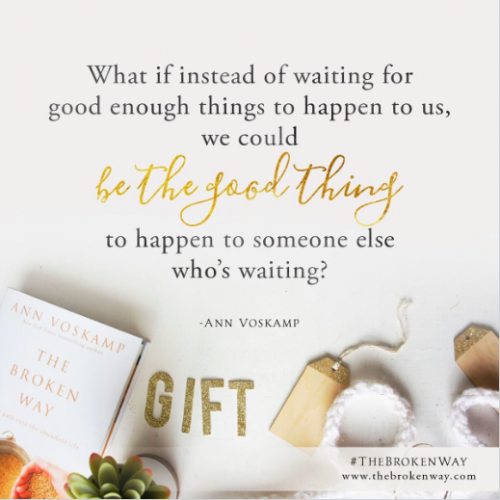
In order to do this, we can’t be afraid of suffering. If we want avoid suffering, we’d have to avoid loving. Elisabeth Elliott says, “I am very aware of the fact that pain is necessary to all of us. In my own life, I think I can honestly say that out of the deepest pain has come the strongest conviction of the presence of God and the love of God.” Too often we try to avoid pain, avoid loss, avoid breaking. But what if we surrender to the broken? Never be afraid of broken things-because Christ is redeeming everything. (p.180) It’s in the shattered places that we are most near the broken heart of God. Can I be okay with the brokenness of things? Embrace the hard? And can I let others into my brokenness? And me into theirs? You can throw up a barrier to vainly keep the hurt out. Or you can break down your barriers, break right open, and let love with all its pain in. Either retreat behind useless, self-protecting barriers- or vulnerably lay the heart out there to be broken… There really is no way to avoid pain. No way to avoid brokenness. There is no way but a broken way. (p 213)
The book ends with the idea that it’s those who have been broken who know how help the broken. It’s those who’ve been wounded who know where to lead others to be healed. And just as Christ was moved with compassion, so we can be moved with compassion. But the challenge is not to just feel compassion for the little boy in the garbage dump on our mission’s trip but to also feel compassion for the hurting co- worker who unfairly let her anger out on you. There’s more compassion in the giving of yourself in hidden, dying ways to the unworthy than there is in giving expensive things in noticed ways to the applauding. (p. 233) We can spend years trying to understand the “whys” of suffering but the question of evil does not need a solution as much as it needs compassion. Because compassion is the solution. While evil can cause all kinds of suffering, all suffering does not need to be evil. It’s in shattered places we are most near the heart of God. Never be afraid of broken things- because Christ is redeeming everything.
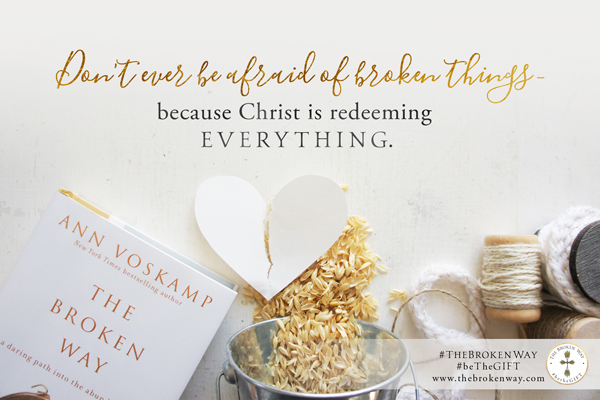
I agree with much of what Voskamp presents here. I can most definitely attest to the fact that Christ meets us, most intimately, in our broken moments- in our suffering. The big seasons of spiritual growth in my life have happened during- or because of- the Hard. The Broken. The Painful. In the past year I had sensed myself fearing His will, knowing that often that will involve the unpleasant. But He has continued to speak peace to my heart and to remind me of the beautiful moments – the intimacy, the communion, that has come out of those dark places. And I find myself more often surrendering to whatever He brings. To struggle less. Accept more.
And in the midst of all of that, I definitely believe we are comforted by our Creator so that we, too, can comfort others. To live given to others who are always experiencing broken- and thus, find communion and fellowship with them as well. I accept His gift of grace during my hard. And then give that gift to others in their hard.
In conclusion, while this book hasn’t been as life changing to me as One Thousand Gifts was, I am still thankful for the reminders in it, especially the challenge to use the hard things God has allowed to be a part of our story and to live given- broken and poured out as a result. Here’s the link if you’d like to take a closer look at ordering it for yourself: The Broken Way
For as we share abundantly in Christ’s sufferings, so through Christ we share abundantly in comfort too.
-II Corinthians 1:5
We…fellow heirs with Christ, provided we suffer with him in order that we may also be glorified with him. -Romans 8:16-17
My goal is to know Him, and the power of His resurrection and the fellowship of His sufferings, being conformed to His death. -Philippians 3:10
Be very glad- for these trials make you partners with Christ in his suffering, so that you will have the wonderful joy of seeing his glory when it is revealed to all the world. – I Peter 4:13
Voskamp, Ann, The Broken Way: A Daring Path Into The Abundant Life. (Grand Rapids, MI: Zondervan, 2016).
